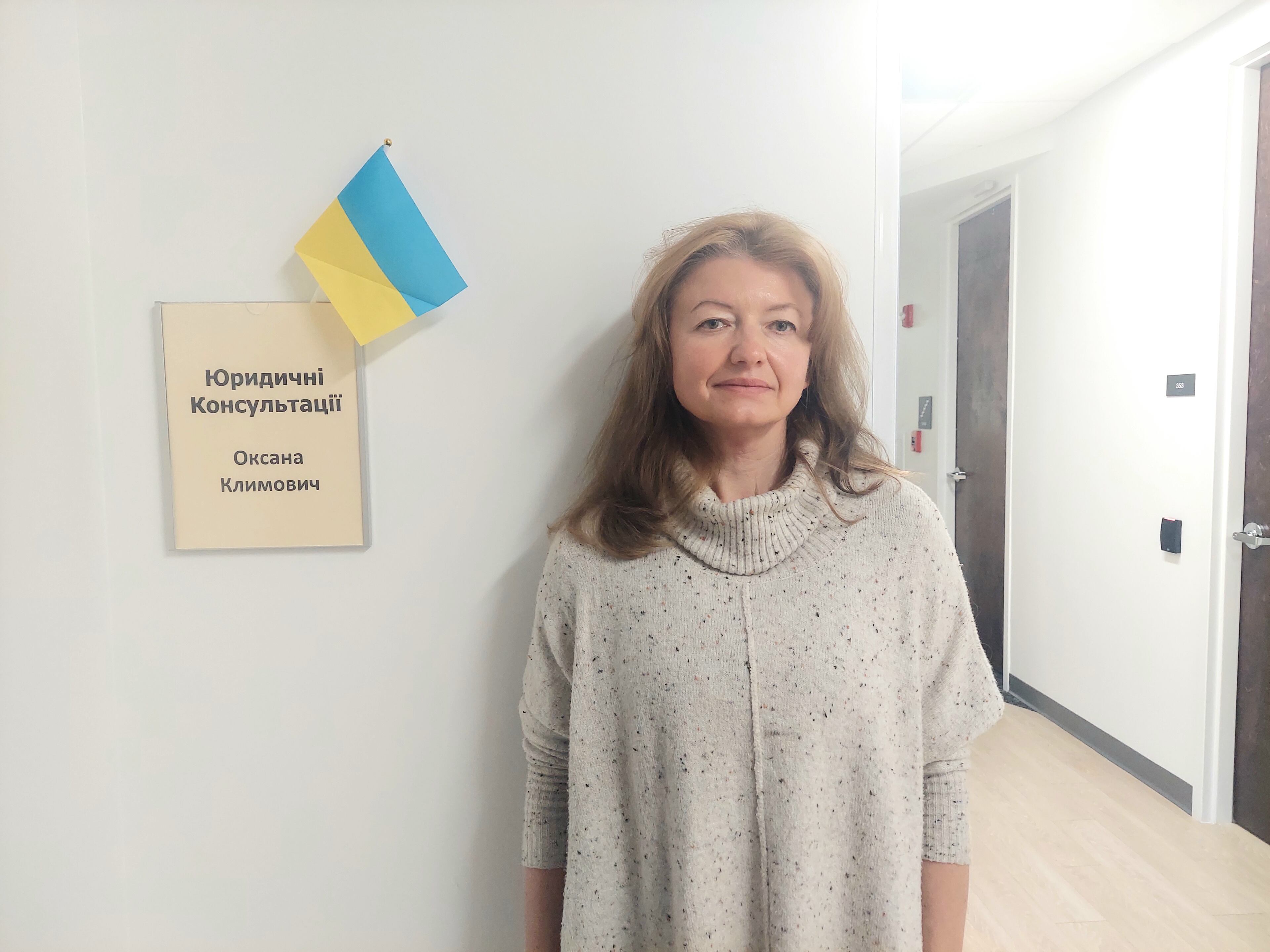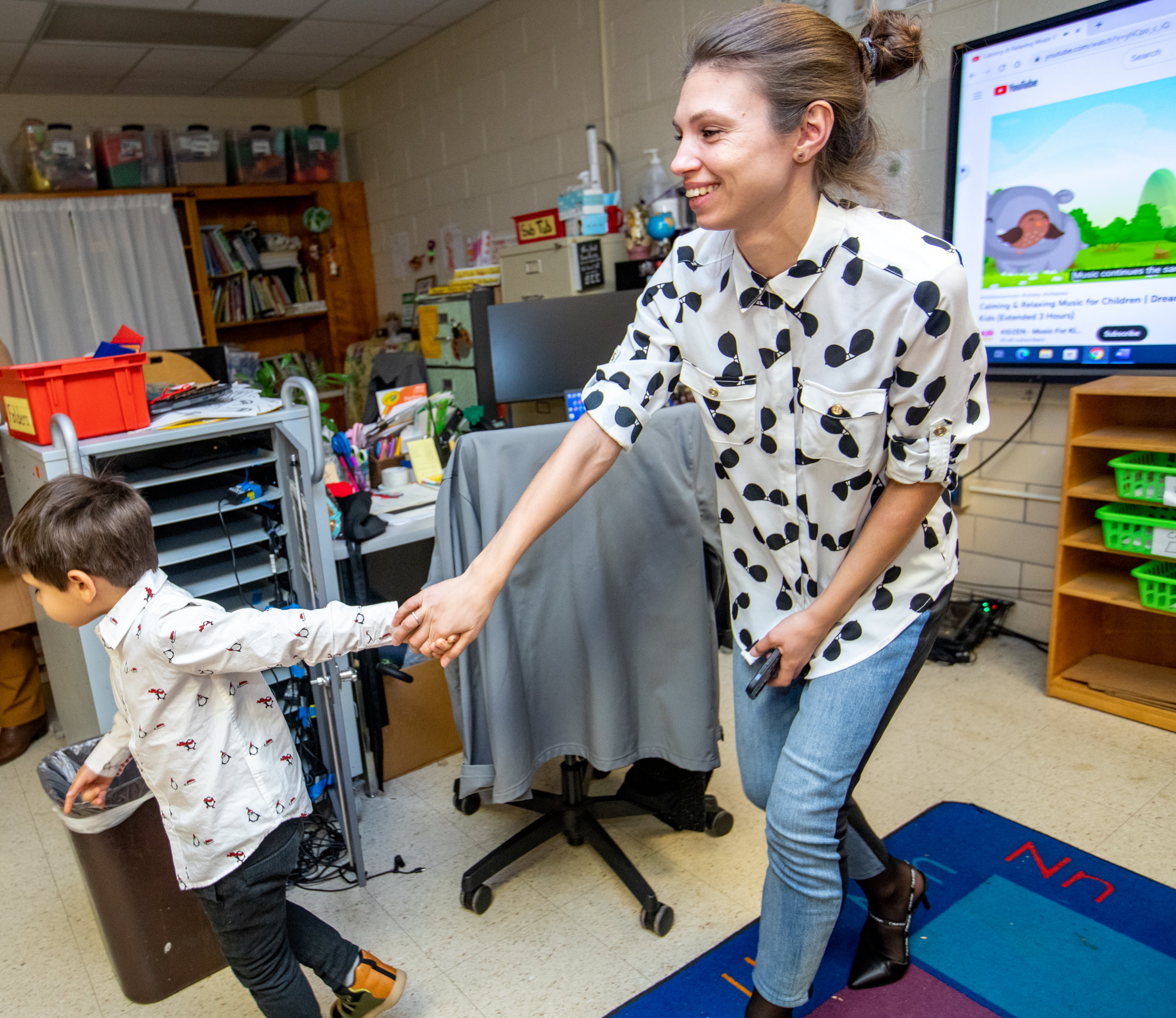Ukrainian refugees fled invasion, start ‘from scratch’ in America

Oleksandra Slasna crossed the border from Ukraine to Slovakia on foot with her 5-year-old son, Yurii, two days after Russia invaded Ukraine last February. She left behind her “really comfortable, amazing life” for an odyssey that brought her to Atlanta, a struggling refugee.
In Ukraine, she said, “I had my own apartment, I had a really cool job with a good salary, we traveled a lot ... I knew everything.
“Here, you begin from scratch.”
With her only possessions a winter jacket and a pair of jeans, Slasna and her son eventually arrived in Atlanta, among more than 100,000 Ukrainian refugees welcomed by the United States in recent months. Here, they found nonprofit organizations with social services to help them establish their new lives with housing, healthcare and other basics.
Yurii’s father and grandmother invited the child and his mother to America, offering support where they were offered support. They arrived in Atlanta on a limited tourist visa but as the war stretched on through the summer months, Slasna needed to make more permanent arrangements for her child and herself.
To officially begin life in the United States, Slasna and her son had to re-enter the country from Mexico to get humanitarian parolee status under a new federal program, Uniting for Ukraine (or U4U). To qualify, Ukrainian nationals must have a supporter in this country who agrees to support them financially while they are in this country, pass security checks and complete vaccination requirements.
If accepted, parolees can stay in the U.S. for up to two years and are eligible for Medicaid or CHIP to the same extent as refugees, without a 5-year waiting period, provided they meet income and state residency requirements for coverage. On Nov. 21, U.S. Citizen and Immigration Services announced that parolees under Uniting for Ukraine do not need to get USCIS employment authorization to be able to work in the U.S.
Uniting for Ukraine was announced on April 21 as part of the Biden Administration’s commitment to accept 100,000 Ukrainian nationals and others fleeing the Russian invasion of Ukraine.
By mid-December, the Department of Homeland Security said that more than 130,000 Ukrainians have been authorized to come to the United States through Uniting for Ukraine and 94,000 of them have already arrived and been processed. Since March 24, DHS said another 127,000 Ukrainians have been accepted into the U.S. outside the Uniting for Ukraine program.
With Yurii’s father sponsoring Slasna, she received parolee status in August but was not yet authorized to work. Instead, she spent her days caring for her son and navigating the American bureaucracy with the help of nonprofit organizations in Atlanta. She said assistance hotlines weren’t always responsive, leaving her to often appear in person to get her social service application questions answered. Without a car in Atlanta, that was a challenge. One month, Slasna said, she spent more than $1,000 in taxi fares.
Among those helping in Atlanta is Oksana Klymovich, a practicing lawyer in both the U.S. and Ukraine who offers free legal consultations for Ukrainian immigrants through the Ukrainian Congress Committee of Atlanta.
“People are concerned. They try to follow the rules, but some rules are difficult to understand,” Klymovich said. She meets immigrants on Saturdays at the Ukrainian Cultural Center in Atlanta.



Language barriers and cultural differences cause some confusion for the refugees, particularly about health care, which is not tied to employment in Ukraine. Klymovich’s organization encourages recent arrivals to enroll in Medicaid or to obtain medical insurance through federal marketplace plans under the Affordable Care Act. Klymovich said many people her group serves don’t understand how to come off Medicaid once they do find employment; the waiting period for benefits eligibility at their new jobs; or how insurance works with premiums, deductibles and copays.
Slasna felt that she didn’t have the words in English to fully explain the nuances of how things work at home, but she “doesn’t get the system here.”
Now that more people are leaving Ukraine for the United States, the Ukrainian Congress Committee of Atlanta has begun offering a variety of services to help recent arrivals navigate these challenges. On Saturdays, the Congress hosts a coffee hour, adult English classes, children’s art classes and Klymovich’s legal consultations.
Klymovich also seeks out and invites refugee aid organizations to present during her consultation hours. Recent groups have included Embrace Refugee Birth Support, a Clarkston-based nonprofit that works to connect expecting mothers to prenatal and postpartum care, and Inspiritus, an Atlanta-based Lutheran organization that helps refugees navigate work authorization, food stamps and Medicaid applications.
“War is not normal… we didn’t know we’d have an influx of people escaping [to the United States],” said Anna Lektman, a spokesperson for the Ukrainian Congress Committee of Atlanta. “We’re [still] learning what kind of problems people have as they come.”
Slasna wishes there were instructions, or a “guide for newcomers”, on how to build a life as a recent arrival. If she didn’t already know English, she said she would have opted to stay in Europe. Only now, after all of her and Yurii’s paperwork is processed and they’re settling into their new lives, can she finally relax.

Things are easier for the pair now. Slasna got a car and Yurii is in kindergarten at Briar Vista Elementary School, learning English. He also takes martial-arts classes. Slasna volunteers with other Ukrainian transplants to fundraise for Ukrainian aid groups by singing and making traditional Ukrainian crafts, food and artwork to sell at weekend artist markets. The Ukrainian Congress Committee of Atlanta is one of the organizations her work funds.
Having a group she can work with to cope with being displaced and connect with other people also helped her adjust to her new life. When she first came to the States, she couldn’t tell her story without crying, but as the months passed, it got easier. While she hopes to one day return to Ukraine, she’s accepted the fact that it will take time for her country to rebuild – and that things won’t be the way she left them.
“I don’t know when the war will finish or if I’ll find a good job here. Maybe we’ll stay until the end of the [U4U] program or maybe we’ll stay here forever,” Slasna said. “We have a lot of friends from the Ukrainian community here... We came because I thought it was the best place for me and my son.”


